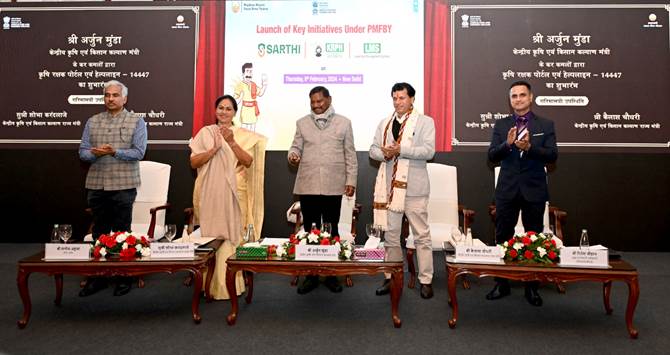Sanjay Kumar Pandey
Ranchi EW News: Minister of Tribal Affairs and Minister of Agriculture and Farmer Welfare, Shri Arjun Munda, inaugurated the centrally operated “Kisan Rakshak Helpline 14447 and Portal,” Agriculture Insurance Sandbox Framework Platform SARTHI, and Learning Management System (LMS) platform for the agriculture community in Delhi under the Prime Minister’s Crop Insurance Scheme (PMFBY). Central Agriculture and Farmer Welfare Minister Smt. Shobha Karandlaje, State Minister for Agriculture and Farmer Welfare Shri Kailash Chaudhary, and Central Agriculture Secretary Shri Manoj Ahuja were also present at the event.
During the program, Minister Munda stated that this nation belongs to the villages, to the farmers. Under the guidance of Prime Minister Shri Narendra Modi, the Ministry of Agriculture has been consistently working to uplift the farmers. Highlighting the commitment of the central government towards strengthening farmers, Minister Munda emphasized that the nation’s strength and resilience depend on the strength and empowerment of its farmers. Keeping this in mind and redefining the advancement of the farming community, the Ministry of Agriculture and Farmer Welfare is working diligently. Through government-initiated schemes, efforts are being made to increase farmers’ income and make them self-reliant. Mentioning the ongoing efforts by the government in this direction, Minister Munda noted the opportunities arising to empower farmers technologically and digitally connect with them to propel them forward.
He further emphasized the government’s commitment to prioritizing the agricultural sector under Prime Minister Modi’s leadership, striving to make it more skilled, competitive, income-oriented, and resilient. Major schemes of the Ministry of Agriculture include the Prime Minister Kisan Samman Nidhi and the Prime Minister Crop Insurance Scheme. Additionally, the formation of 10,000 new Farmer Producer Organizations (FPOs) is underway, yielding positive results. Programs like the Prime Minister Irrigation Program, National Food Security Mission, Horticulture Mission, Sustainable Agriculture under the National Mission, and Farmer Credit Cards are being implemented to address the needs and benefits of farmers.
Minister Munda underscored the primary objective of these schemes to increase farmers’ income and reduce risks in agricultural activities. In the current scenario, where investment is crucial for agricultural growth, it is also necessary to mitigate risks arising from natural or man-made causes. The Prime Minister Crop Insurance Scheme has proven effective in this regard. With over 15 crore farmers enrolled since its inception, the scheme has disbursed claims worth Rs 1.52 lakh crore against premiums of Rs 29,237 crore.
He stated that amidst the era of climate change, the Prime Minister Crop Insurance Scheme has been a boon for small and marginal farmers. Governments in states like Maharashtra, Odisha, Tripura, and Andhra Pradesh have extended support to farmers by providing universal coverage with just Rs 1 premium. Continuous efforts are being made to improve the implementation of the scheme. The government is committed to enhancing such schemes in the agricultural sector to reduce risks and improve farmers’ income. Officials should strive to address farmers’ issues with data, ensuring that our farmers do not feel disheartened but rather have faith in the government’s support and move forward confidently.
The Ministry of Agriculture is tirelessly working towards fulfilling Prime Minister Shri Modi’s vision of building a developed India by 2047, ensuring work for farmers, youth, mothers, and the underprivileged. The organized efforts of the Ministry of Agriculture are benefiting the nation’s food providers. Initially, CEO of the Prime Minister Crop Insurance Scheme and Joint Secretary of the Ministry of Agriculture, Shri Ritesh Chauhan, delivered a welcome speech. Additional Secretary (Credit) Kamna Sharma expressed gratitude. Officials from central and state governments, insurance companies, technical institutions, and other stakeholders involved in the scheme attended the program.


